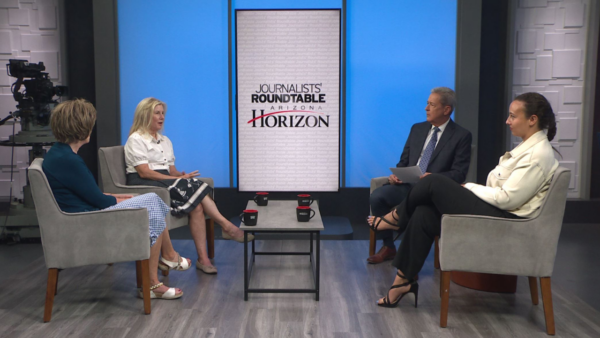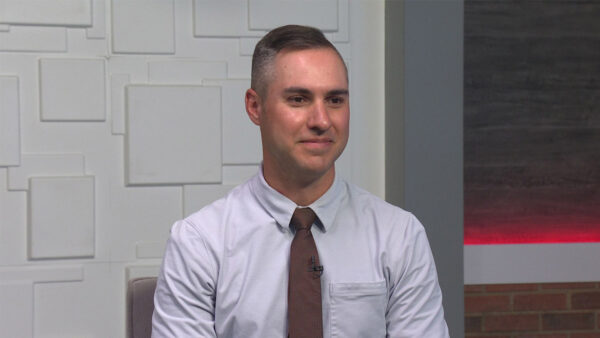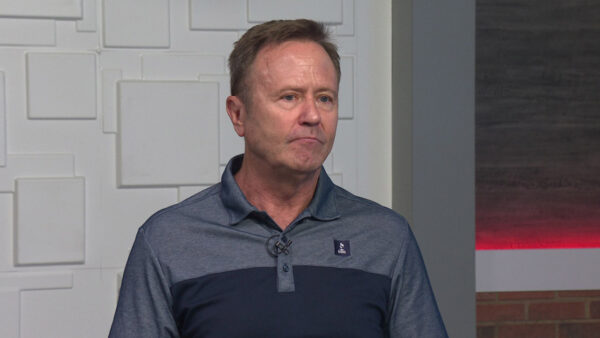The Arizona Board of Education has adopted principles of agreement that will guide the development of the next generation of A through F school accountability profiles. The goal of the new profiles will be to provide parents and other education stakeholders with an apples-to-apples education achievement measurement tool. Board member Jaime Molera will discuss the new principles for the A through F school accountability profiles.
Ted Simons: Tonight's edition of Arizona education looks at changes coming to the state's public schools. Starting this spring, students across Arizona will take a new test to measure their progress. Also, the state board of education is looking at new ways to hold schools accountable. We'll hear more about that in a moment, but first producer Cristina Estes shows us what's in store.
Christina Estes: Every year Arizona schools receive a letter grade of A through F. They are designed to make decisions and hold schools accountable. Each school is evaluated on its students' academic growth and how many pass the Arizona instrument to measure standards' test.
Dr. Althe Allen: The challenges with that system, especially at the high school level, is that the system measures one test, one point in time, at one grade level. So, it is a very narrow snapshot of a student's progress.
Christina Estes: Dr. Allen is the associate superintendent for the state's biggest high school-only district. Phoenix union has 16 schools with more than 27,000 students. She's looking forward to next year, when a new test, called Arizona merit, will replace Ames.
Dr. Althe Allen: It's not just that at the high school level, one test at the end of the year. It's multiple tests across multiple subject areas at the ninth grade, tenth grade, and 11th grade. So, we're going to have a much better picture of a student's true progress over time.
Christina Estes: The change comes as the state board of education looks to change the way that schools get their letter grades. Rather than rely on scores from one test, the board favors a plan that would award points based on the number of advanced placement and career and technical education classes, along with the scores on the sat and other tests.
Dr. Althe Allen: If kids are truly going to be successful in college, and in career, we have to have multiple measures to show that we're preparing kids for those endeavors.
Christina Estes: As Arizona introduces new ways to test students and grade schools, Dr. Allen hopes one group will get extra attention.
Dr. Althe Allen: I am not concerned about the level of our curriculum, how our kids will do, our kids, you know, will, we'll prepare them and they will do just fine, and our letter grades, we will be able to explain what they represent. But, teachers work hard, day in and day out. So, I guess my only concern or fear is that when something new comes about, or they feel like it's thrown at them, they feel defeated. They work very, very hard, so we're going to have to help them navigate through this time.
Ted Simons: The state board of education plans to ask lawmakers to approve a two-year transition period for the new school accountability system. Here now with more on the approval A through F guidelines is board member Jaime Molera. Let's get some more information here as far as what the board, the committee and the board looked at and what the committee and the board decided.
Jaime Molera: Well, the big thing was looking at, as we were moving into the new standards and assessment, was making sure that we didn't lose the innovation at a local level. That we want to see happen. Part of what the board did, was, I think, it was contrary to the rhetoric going on about common core. We said that we need to have, essentially, a statewide audit, which this assessment, statewide assessment will do so we can measure apples to apples, so if we really want a marketplace, we can do that, but we also looked at how can a local level, at a local level.Could school districts, charter schools, select their own areas of assessment that would be an academic framework but that would be part of the gradient grading system.
Ted Simons: Are there diagnostic ideas floating around? Are you looking at?
Jaime Molera: Absolutely, so for instance, you have certain schools that might have a science emphasis, and right now we don't have a science assessment, which is of the but not part of the standards. So, what we're saying, if science is that important and an emphasis of that school, and they use A.P. exams, and, of course, A.P. is in high school or the act, or some schools use Galileo, and they should be able to assess that, but you have the statewide assessment that could be an audit of that, if you will, to show that if that school is saying they are doing fantastic, the statewide assessment will help to mirror that.
Ted Simons: Are you saying that the different districts can use different diagnostic material, and would the state oversee everything?
Jaime Molera: Yes and if there is a framework, and that's what the state board would have to do, to say here are the certain types of assessments that we would allow, of course, and couldn't be just the assessment system that I would produce, but it would have to be valid, reliable assessments. But, the fact of the matter is, let's allow for that academic creativity, for instance, we have a lot of career and technical education schools, that they teach. Let's allow that to happen. Let's allow the school districts to design their own assessments, but you still have a statewide assessment that can verify how we're doing.
Ted Simons: And also in the report, or at least what I saw from the committee's recommendations, use only academically relevant information. What does that mean?
Jaime Molera: So, for instance, drop-out rates, and making sure that we have an opportunity to look at the core study based encore academic materials. I reference science. Other school districts, want to emphasize history, and civics. As a big piece of what they want to teach, but that has to be on the academic focus.
Ted Simons: As far as -- we saw in the package, and we hear a lot about this, the concern that a single test overwhelms everything else, what does the board look at and consider regarding having a test being the alpha and omega?
Jaime Molera: That's the point, is so that if you have multiple assessments, it gives parents a better feel of what it is that the school is trying to accomplish, and again, you allow for that school or school district to have that kind of creativity if they say, we want to have an emphasis in this particular type of academics, and we want to do that, we are good at it, and at the same time, we can provide the mathematics and language arts, what the state is requiring, but we want to also capture this focus of academics that's important to us.
Ted Simons: And as far as an A school, did the grading, itself, I mean, have to be considered? Is an A school needs to really be an A school, doesn't it?
Jaime Molera: In my definition, an A school needs to be where a parents understands if my kid goes through the system, is it an A school district or goes through the process and graduates, they should not need remediation when they go onto an institution of higher education. Right now, we have about 55 to 60% of our kids in core academic areas, if they go onto the system, they need some kind of remediation. And if we are serious about career and college ready, that really should not happen.
Ted Simons: And if you are serious about grading, growth has to be involved. Does it not?
Jaime Molera: And growth is absolutely involved. And one of the things that we capture is this. Let's say that you have a teacher that gets kids that might be at the 20th percentile in third grade, but over the course of that year, they get them to the 45th percentile so they have made strides on behalf of that student and that class. But, under the old regime, a lot of teachers will be penalized because they are below the standards, we need to take into consideration how much that teacher has grown that kid and those students academically. And that's why those pieces have to come together.
Ted Simons: All right, what's next in all of this and have you heard any response now from superintendent-elect Diane Douglas?
Jaime Molera: Not much response from her. I am heartened because a lot of the groups that put this together, which included a lot of business groups, Arizona Chamber of Commerce, along with the charter school association, along with school boards, association, groups like Lisa's group, Ace of Arizona, have rallied around legislators and the new Governor talking about why this is important, and again, getting away from the rhetoric and the politics around common core, and saying, let's design an Arizona eccentric accountability system, a meaningful accountability system. And let's move forward with that.
Ted Simons: And the bottom line is, the school accountability system does need reforming and it will be reformed.
Jaime Molera: Yes.
Ted Simons: All right. Good to have you here.
Jaime Molera: Good to be here, as always.
Jaime Molera:Board Member, Arizona Board of Education;























